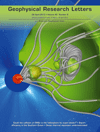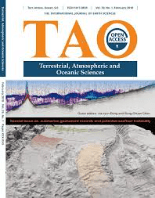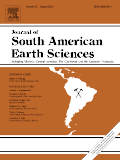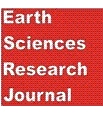
AGU Advances
metrics 2024
Transforming Ideas into Impactful Research
Introduction
AGU Advances, published by the American Geophysical Union, is a premier Open Access journal established in 2020, dedicated to advancing the field of Earth and Planetary Sciences. With an impressive Q1 ranking in the 2023 category of Earth and Planetary Sciences (miscellaneous) and a Scopus rank of #81/195, it serves as a vital platform for researchers, professionals, and students to share their findings and innovations. The journal fosters a collaborative environment, encouraging interdisciplinary approaches and high-quality research that addresses the fundamental questions of our planet and beyond. With its commitment to accessibility, AGU Advances ensures that cutting-edge research is available to a global audience, supporting the dissemination of knowledge that is crucial for addressing current and future scientific challenges. For those keen on contributing to or accessing groundbreaking studies in this dynamic field, AGU Advances is an invaluable resource.
Metrics 2024
 -
- 8.30
8.30 8.40
8.40 -
-Metrics History
Rank 2024
IF (Web Of Science)
JCI (Web Of Science)
Quartile History
Similar Journals

GEOPHYSICAL RESEARCH LETTERS
Advancing Earth Science, One Letter at a Time.GEOPHYSICAL RESEARCH LETTERS is a renowned academic journal published by the American Geophysical Union that plays a pivotal role in advancing the field of Earth and Planetary Sciences. Established in 1974, this esteemed journal provides a platform for the latest research and innovations in geophysics, including but not limited to, solid earth, atmospheric sciences, and oceanography. With its impressive ranking of #7 out of 165 in Geophysics and #13 out of 195 in General Earth and Planetary Sciences according to Scopus, and being categorized in the Q1 quartile for both fields in 2023, it is a leading choice for academic and professional researchers alike. While GEOPHYSICAL RESEARCH LETTERS does not currently offer open access, it remains committed to disseminating high-quality, peer-reviewed scientific literature. With ongoing contributions expected through to 2024, this journal is essential for those who seek to deepen their understanding and engage with cutting-edge developments in geophysical research. Its influence and reach underscore its significance in shaping the future of geophysical inquiry.

TERRESTRIAL ATMOSPHERIC AND OCEANIC SCIENCES
Bridging Oceans and Atmospheres Through ResearchTERRESTRIAL ATMOSPHERIC AND OCEANIC SCIENCES, published by SpringerNature, is a distinguished peer-reviewed journal that has been an essential platform for innovative research in the fields of atmospheric science, oceanography, and Earth and planetary sciences since its inception. With an Open Access policy established in 1990, the journal ensures wide dissemination of knowledge, allowing researchers, professionals, and students to access cutting-edge findings without restrictions. Based in Switzerland and featuring a comprehensive coverage from 1996 to 2024, the journal currently holds a Q3 ranking across various categories, indicating its growing significance in the scientific community. Although it is positioned within the 39th percentile in Earth and Planetary Sciences, its commitment to fostering high-quality research makes it a valuable resource for advancing understanding of terrestrial environments and their interconnections. Researchers seeking a platform for their work in atmospheric and oceanic sciences will find TERRESTRIAL ATMOSPHERIC AND OCEANIC SCIENCES to be an ideal venue for sharing their insights with a global audience.

Physio-Geo
Connecting Disciplines, Transforming KnowledgePhysio-Geo (ISSN: 1958-573X) is a distinguished open-access journal published by REVUES ORG, dedicated to advancing the fields of Earth and Planetary Sciences, with a special focus on Earth-Surface Processes, Environmental Science, and Ecology. Since its inception in 2007, Physio-Geo has provided a platform for researchers, professionals, and students to disseminate and access high-quality studies that contribute to the understanding of our environment. With a convergence period from 2019 to 2024, the journal aims to bridge disciplinary gaps and foster interdisciplinary research that addresses pressing ecological and environmental challenges. Despite its current Scopus rankings reflecting an early-stage development, the journal is poised to enhance its impact within the scientific community, particularly as it embraces a wider audience through its open-access model. By offering valuable insights and comprehensive analyses, Physio-Geo is an essential resource for those seeking to explore the complex interactions between physical geography and ecological systems.

Geologos
Advancing Earth Science Insights for a Global CommunityGeologos is a peer-reviewed journal dedicated to advancing knowledge in the field of Earth and Planetary Sciences. Published by SCIENDO, this Open Access journal has been facilitating unrestricted access to research findings since 2009, ensuring that scholars, professionals, and students can engage with up-to-date scientific discourse without barriers. With an ISSN of 1426-8981 and an E-ISSN of 2080-6574, Geologos is indexed in Scopus, where it currently holds a rank of #111 out of 195 in the General Earth and Planetary Sciences category, reflecting its commendable impact within the discipline. Based in Poland, the journal embraces contributions from international authors, promoting a diverse and inclusive dialogue on topics ranging from geological phenomena to planetary processes. As a Q3 journal in the Earth and Planetary Sciences category, Geologos is committed to enhancing the understanding and appreciation of the Earth's systems, making it an essential resource for those engaged in research and practice within this dynamic field.

EARTH AND PLANETARY SCIENCE LETTERS
Fostering Scholarly Dialogue on Planetary ProcessesEARTH AND PLANETARY SCIENCE LETTERS, published by ELSEVIER, stands as a premier academic journal in the fields of Earth and Planetary Sciences, Geochemistry and Petrology, Geophysics, and Space and Planetary Science. Since its inception in 1966 and continuing to 2024, the journal has consistently maintained an impressive reputation, ranking in the top quartile (Q1) across several categories, highlighting its vital role in advancing scholarly research. With a Scopus ranking of #4 in both Geophysics and Geochemistry and Petrology, and a notable 97th percentile in multiple Earth sciences categories, EARTH AND PLANETARY SCIENCE LETTERS provides a platform for groundbreaking research, encouraging rigorous investigation and dissemination of knowledge. While not available as an Open Access publication, the journal remains highly accessible to academics and professionals worldwide, providing invaluable insights and fostering discussions that influence the future of Earth sciences. Whether you are a researcher, educator, or student, this journal is a crucial resource for understanding our planet and its processes.

Geofizika
Illuminating the Path of Earth Science ResearchGeofizika, an esteemed journal published by the Andrija Mohorovičić Geophysical Institute at the University of Zagreb, presents a significant platform for research in the fields of geophysics and Earth sciences. With an Open Access model established since 1984, this journal ensures that scientific knowledge is accessible to a broad audience, encouraging collaborations and the free exchange of ideas. Geofizika has steadily evolved through its converging years from 1989 to 1999 and has been active from 2003 to the present, reflecting its commitment to advancing geophysical research. The journal has been recognized for its contributions to Earth and Planetary Sciences and has acquired respectable ranks in various categories; notably, it holds a Q4 status in Geophysics as of 2023. Researchers, professionals, and students will find Geofizika a valuable resource for the latest discoveries and methodologies in geophysics, supporting the academic community in expanding the frontiers of knowledge in these vital scientific domains.

Geosciences
Uncovering Geological Insights for a Sustainable Future.Geosciences is a prestigious open-access journal published by MDPI, dedicated to advancing research in the field of Earth and Planetary Sciences. Since its inception in 2011, this journal has fostered a collaborative environment for the dissemination of innovative ideas and findings, contributing significantly to the academic community's understanding of complex geological processes. The journal has achieved a commendable 2023 ranking in the second quartile (Q2) within its category, highlighting its impact and relevance in the field, with a Scopus rank of #41 out of 195 journals, placing it in the 79th percentile. With an aim to span a broad range of topics from environmental geology to planetary exploration, Geosciences is pivotal for researchers, professionals, and students looking for an accessible platform to share their work and stay informed of the latest developments. As a fully open-access journal, it ensures that high-quality research is freely available, fostering greater dissemination of knowledge across the globe.

JOURNAL OF SOUTH AMERICAN EARTH SCIENCES
Exploring the Depths of South American GeologyJOURNAL OF SOUTH AMERICAN EARTH SCIENCES is a premier interdisciplinary journal dedicated to publishing high-quality research in the fields of Earth-Surface Processes, Geology, and Paleontology, making it an essential resource for scientists and researchers focused on South American geology and its diverse geological phenomena. Published by Pergamon-Elsevier Science Ltd in the United Kingdom, this journal has been instrumental in disseminating groundbreaking studies since 1988, showcasing contributions that push the boundaries of knowledge in Earth and Planetary Sciences. With an impressive Scopus ranking—positioning it in the 74th percentile for Paleontology and 71st for Geology—this journal not only reflects robust academic quality but also its commitment to addressing critical geological challenges in South America. Researchers will appreciate its objective of advancing understanding of geological processes while providing insights into past, present, and future Earth environments. Although available through traditional subscription models, the journal's vast repository of articles enriches the academic landscape, facilitating the sharing of vital research among professionals, students, and geological practitioners.

All Earth
Bridging Disciplines for Earth’s FutureAll Earth is an esteemed open-access journal published by Taylor & Francis Ltd, dedicated to multidisciplinary research in the fields of Earth and Planetary Sciences, Global and Planetary Change, as well as Management, Monitoring, Policy, and Law. Since its inception in 2021, All Earth has swiftly positioned itself in the academic community, achieving notable rankings such as Q2 in Earth and Planetary Sciences and Q3 in related fields, showcasing its commitment to high-quality interdisciplinary scholarship. Researchers and professionals can benefit from its accessible content, which contributes to the ongoing discourse on critical environmental issues and innovative solutions for sustainable development. The journal is based in the United Kingdom and continues to be a vital source of information and inspiration for students and scholars aiming to tackle the pressing challenges of our planet through rigorous scientific inquiry and policy analysis.

Earth Sciences Research Journal
Empowering Scholars with Open Access KnowledgeThe Earth Sciences Research Journal, published by the UNIV NACIONAL DE COLOMBIA, serves as a pivotal platform for the dissemination of knowledge in the diverse field of Earth and Planetary Sciences since its inception. With an ISSN of 1794-6190 and an E-ISSN of 2339-3459, this Open Access journal has been committed to providing unrestricted access to high-quality research since 2004. Located in Bogotá, Colombia, it has gained recognition within the academic community, achieving a Q3 quartile ranking in Earth and Planetary Sciences and notable Scopus rankings, which further underscores its relevance and reach. Its scope encompasses varied research topics, making it an essential resource for researchers, professionals, and students alike, seeking to contribute to or stay informed on the latest developments in the Earth sciences up to the year 2024. The journal not only anticipates cutting-edge research but also emphasizes collaborative dialogues among global experts, driving forward the conversation on critical issues facing our planet.